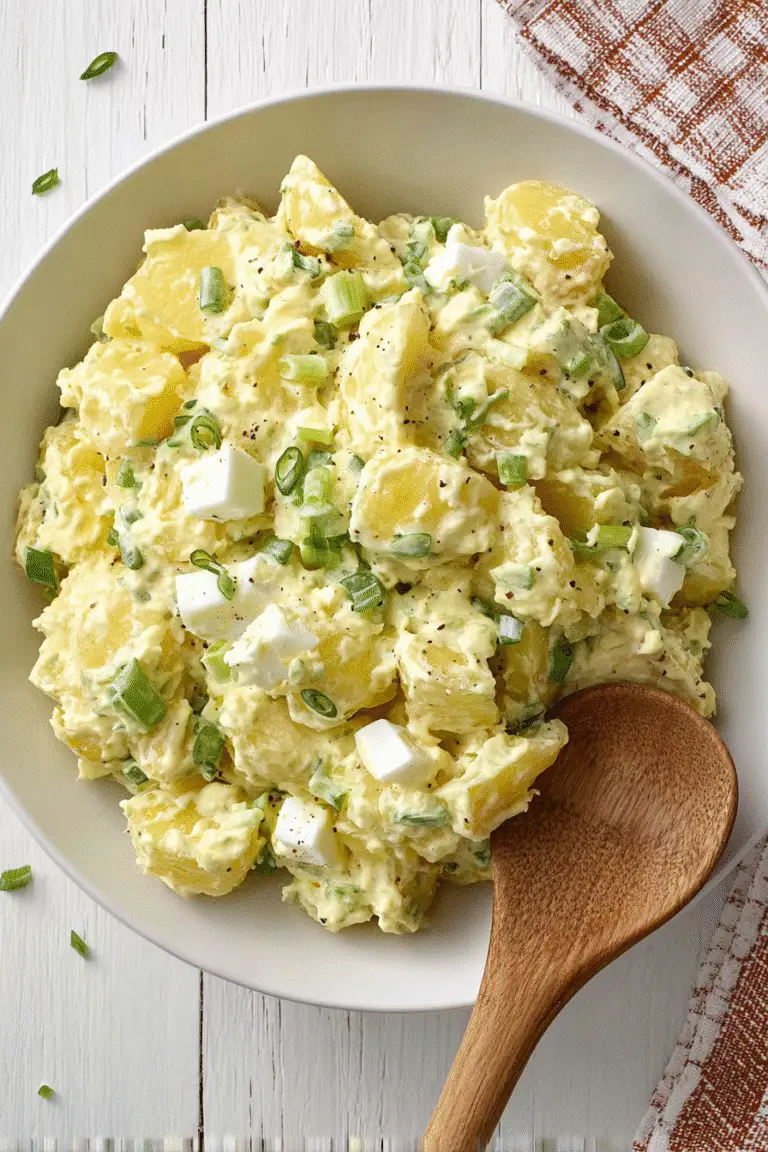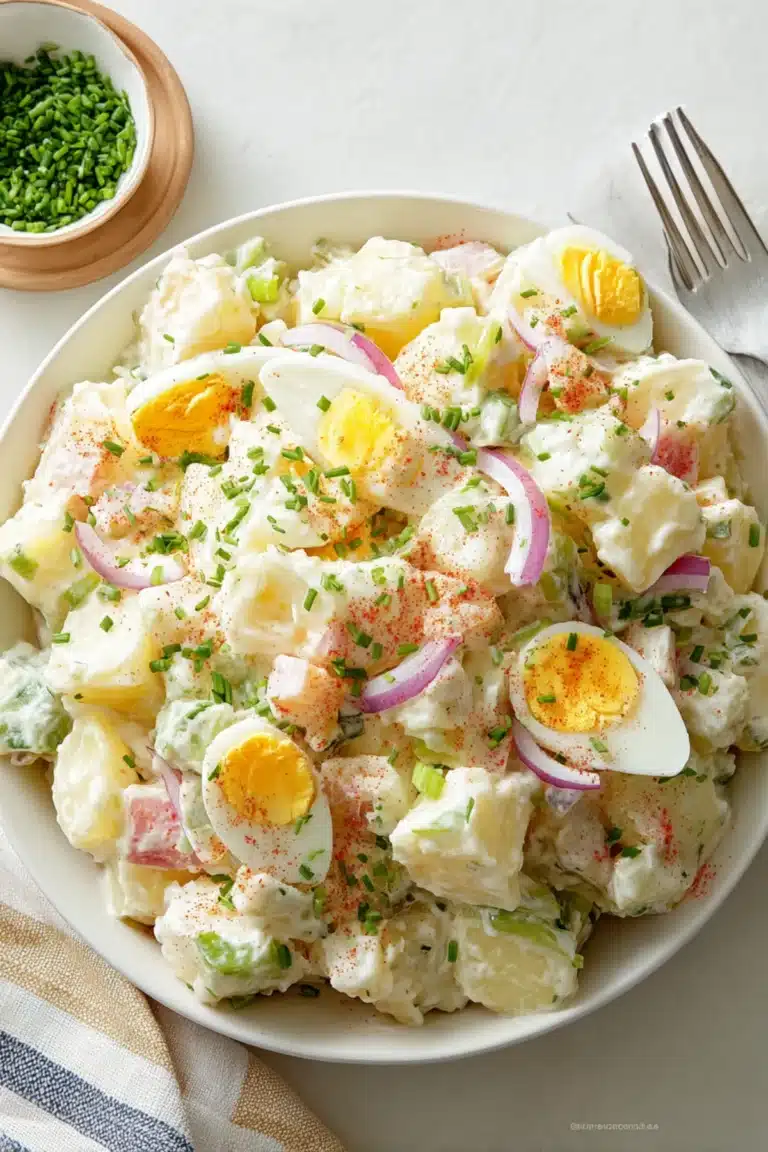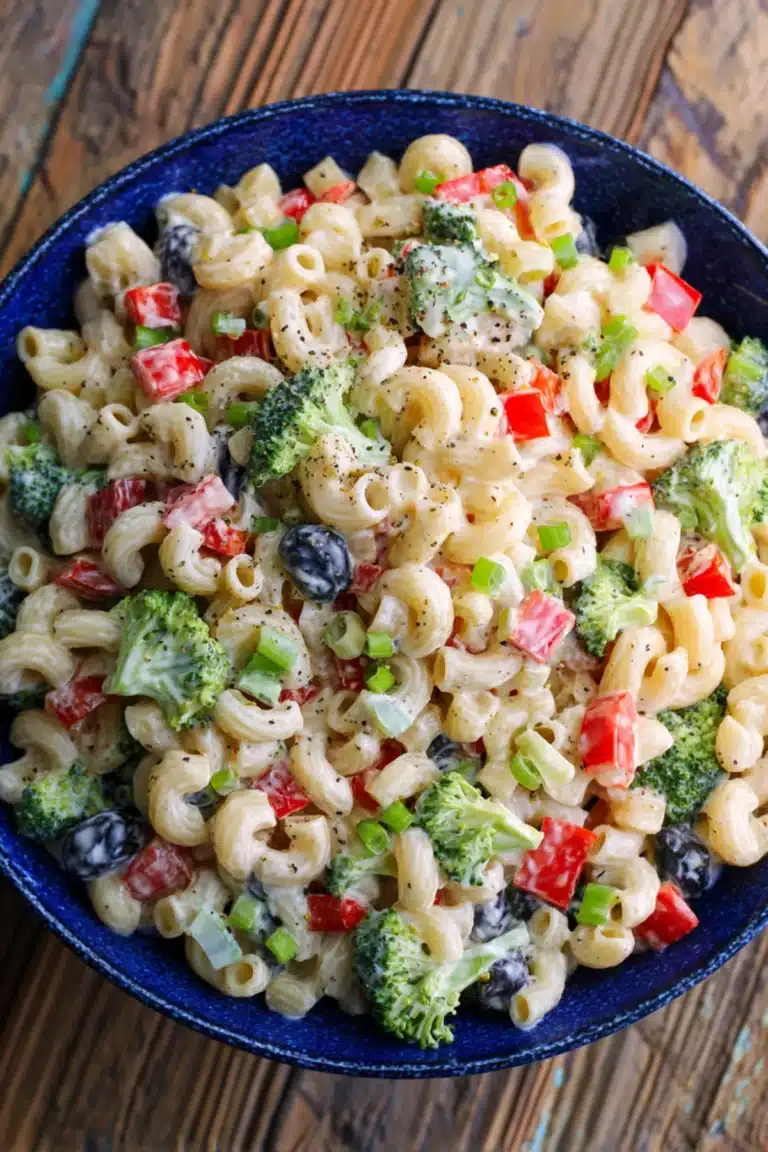Lebanese Potato Salad
A Taste of Childhood Summers in Beirut
Lebanese potato salad was one of the first dishes that truly made me fall in love with food. I remember being ten, sitting in my grandmother’s warm kitchen nestled in the mountains of Lebanon.
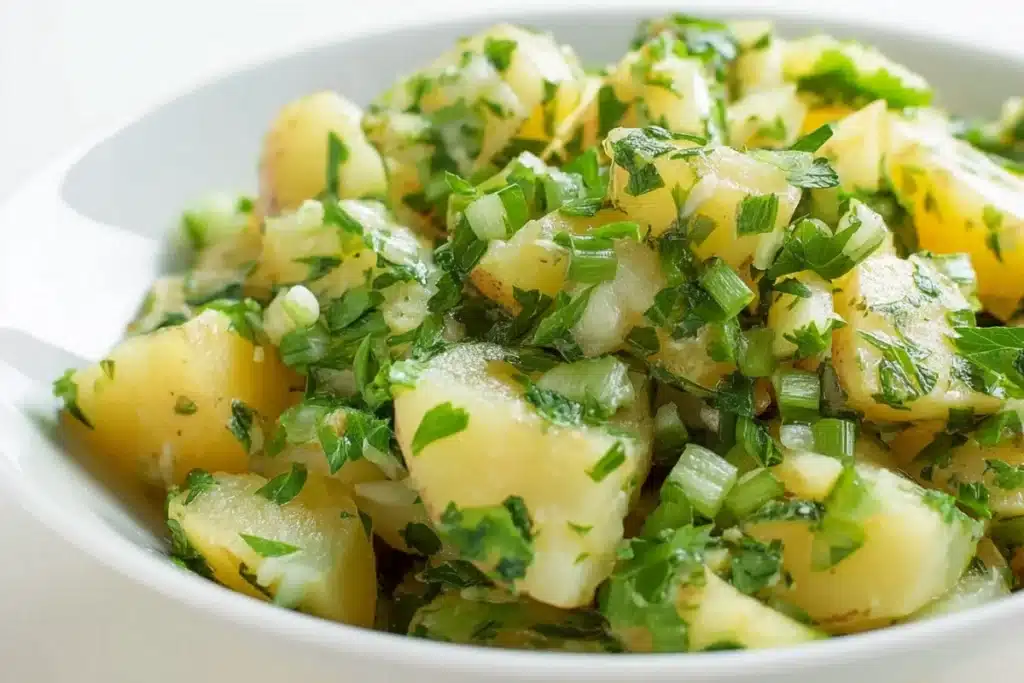
The sunlight poured through the shutters as she gently peeled boiled potatoes, then added lemon juice and olive oil with such care it felt ceremonial. I didn’t know it then, but that bowl of herby, lemony potatoes would shape my understanding of comfort food forever.
Years later, I still make it the way she did—fresh, vibrant, and full of love.
Try our Tuna with Potato Salad — a hearty and satisfying twist on the classic.
What Is Lebanese Potato Salad?
A Unique Take on Classic Comfort
When people think of potato salad, they often imagine a heavy, mayonnaise-laden dish. But Lebanese potato salad breaks that mold entirely. This version is bright, citrusy, and herb-forward. No mayo. No dairy. Just clean, healthy ingredients tossed together in a dressing of lemon juice and olive oil.
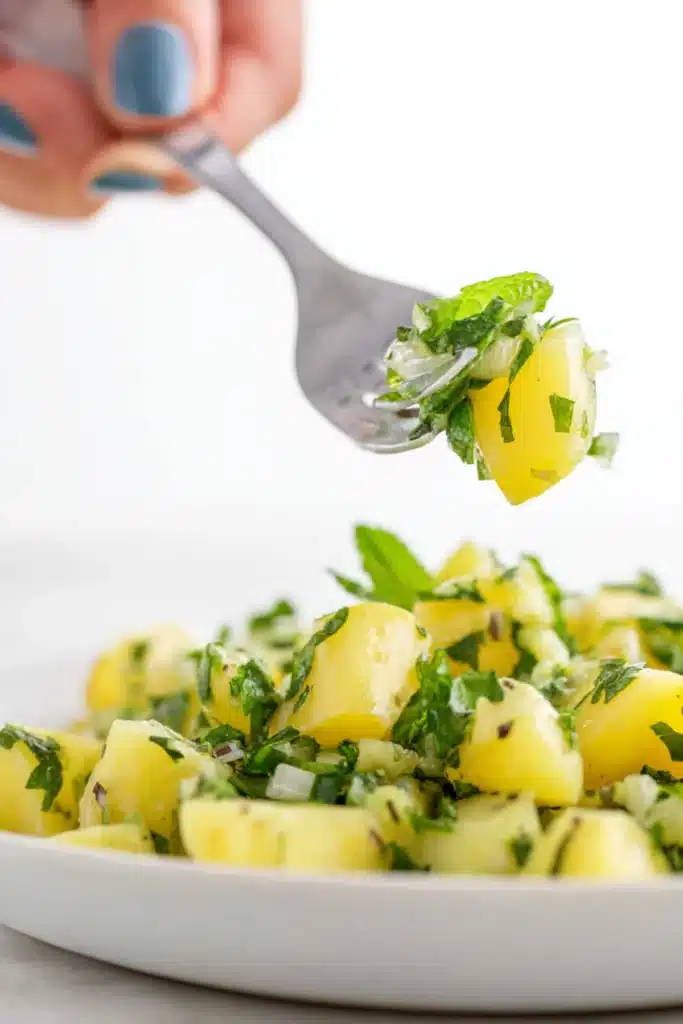
The beauty of this salad lies in its simplicity. With just a few ingredients, it transforms into something elegant and satisfying. The flavor is earthy yet zesty, thanks to the mint and fresh lemon. It’s refreshing enough to serve in summer, but hearty enough to enjoy year-round.
This Mediterranean twist is not just a side dish—it’s a cultural expression on a plate. It belongs at family gatherings, Sunday lunches, and even picnics. And if you’re someone who enjoys clean eating without sacrificing taste, you’re going to fall in love with this version.
Our Potato and Cucumber Salad blends freshness with simplicity for a perfect summer bite.
Traditional vs. Lebanese Potato Salad
Let’s break it down. A traditional Western-style potato salad often contains:
| Ingredient | Traditional Version | Lebanese Version |
|---|---|---|
| Base | Boiled potatoes | Boiled potatoes |
| Dressing | Mayonnaise, mustard | Lemon juice, olive oil |
| Herbs | Sometimes dill or chives | Parsley, mint, scallions |
| Flavors | Creamy, rich | Fresh, tangy, citrusy |
| Texture | Dense and creamy | Light and clean |
The absence of mayonnaise means it’s also vegan, dairy-free, and lighter on the stomach. Plus, it doesn’t spoil as quickly in warm weather—perfect for barbecues or outdoor meals.
You’ll also find that Lebanese potato salad aligns beautifully with today’s health-conscious eating trends. It’s gluten-free, anti-inflammatory, and packed with plant-based goodness—all while being incredibly flavorful.
Stay tuned for the next part—the essential ingredients that give this dish its magic.
Print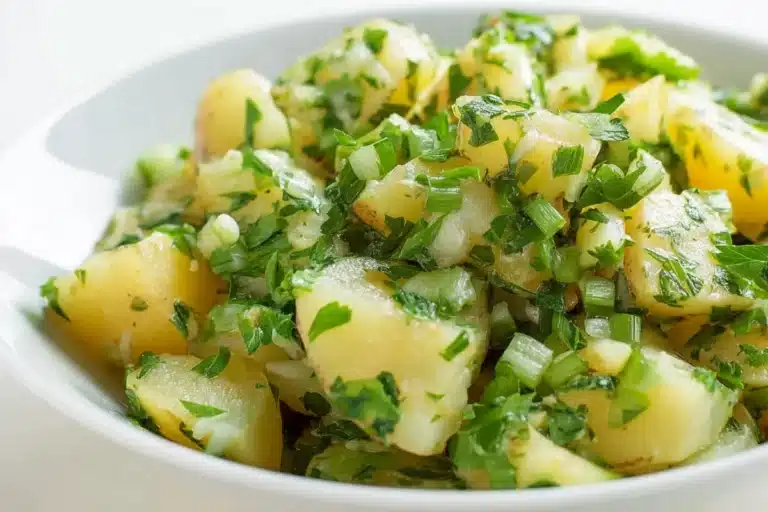
Lebanese Potato Salad
This Lebanese potato salad is a light, refreshing twist on the traditional potato salad—made with zesty lemon juice, fragrant herbs, and heart-healthy olive oil. It’s vegan, gluten-free, and perfect for meal prep or family gatherings. Ready in under 30 minutes, it’s a staple side dish in Lebanese cuisine that pairs beautifully with grilled meats or mezze spreads.Try this easy recipe today and bring Mediterranean freshness to your table!
- Total Time: 25 minutes
- Yield: 4
Ingredients
- 750 grams potatoes (firm, waxy type like Yukon Gold or red)
- ¼ cup fresh parsley (chopped)
- ¼ cup spring onions (green onions, finely chopped)
- 1 tablespoon dried mint (or 2 tbsp fresh, finely chopped)
- ¼ cup extra virgin olive oil
- ¼ cup fresh lemon juice
- 1 clove garlic (optional, crushed)
- Salt (to taste)
- Black pepper (freshly ground, to taste)
Instructions
Boil the Potatoes
- Place whole, unpeeled potatoes in a large pot. Cover with cold water, about 2 inches above the potatoes.
- Bring to a gentle boil over high heat, then reduce to medium and simmer until fork-tender (about 12–15 minutes).
- Drain and let cool slightly before peeling and cutting into bite-sized chunks.
Prepare the Herbs & Dressing
- In a large mixing bowl, combine chopped parsley, mint, spring onions, and optional garlic.
- In a separate bowl, whisk together olive oil, lemon juice, salt, and pepper.
Assemble the Salad
- Add the potato chunks to the herb mixture.
- Pour the dressing over the salad and gently toss until well combined. Be careful not to break the potatoes.
- Adjust salt, pepper, or lemon to taste.
Rest and Serve
- Let the salad sit for 15–30 minutes at room temperature to let the flavors meld.
- Serve slightly warm, at room temperature, or chilled.
Notes
| Nutrient | Amount |
|---|---|
| Calories | 210 kcal |
| Fat | 12g |
| Carbs | 22g |
| Protein | 2g |
| Fiber | 3g |
| Sugar | 1g |
| Saturated Fat | 1.5g |
| Sodium | 240mg |
| Cholesterol | 0mg |
- Prep Time: 10 minutes
- Cook Time: 15 minutes
- Category: Side Dish
- Cuisine: Lebanese, Mediterranean
Key Ingredients That Make Lebanese Potato Salad Special
Essential Ingredients in Lebanese Potato Salad
What truly sets Lebanese potato salad apart from any other version is the incredible flavor delivered by a few humble, fresh ingredients. Each component has a purpose—either to bring brightness, aroma, or earthiness to the dish. Here’s what you’ll need:
- Potatoes (750 grams) – The foundation of this salad. Choose waxy potatoes like Yukon Gold or red potatoes that hold their shape after boiling. They give the salad that soft yet firm texture.
- Fresh parsley (¼ cup) – Adds that essential herby, green kick. Parsley brings freshness and depth.
- Spring onions (¼ cup, chopped) – Also known as green onions or scallions, these provide a light, zesty sharpness that wakes up your palate.
- Mint (1 tablespoon, dried or fresh) – A must-have in Lebanese potato salad, mint offers a cooling balance to the lemony punch. It’s a signature flavor in many Lebanese dishes.
- Lemon juice (¼ cup) – The acid that brightens everything up. It gives the potatoes their tangy edge and elevates every bite.
- Olive oil (¼ cup, extra virgin) – Smooth, rich, and essential. It’s the base of the dressing and brings all the ingredients together.
- Garlic (optional, 1 clove) – Crushed raw garlic adds heat and punch. You can skip it for a milder version, but just one clove gives a beautiful kick.
- Salt and pepper (to taste) – The final touch to balance the flavors.
Every ingredient in Lebanese potato salad has been carefully chosen over generations. It’s not just about taste—it’s about tradition, balance, and simplicity.
This Smoky Potato Salad delivers bold flavor with grilled notes you’ll crave.
Why Freshness Matters in Lebanese Potato Salad
In Lebanese cuisine, freshness isn’t optional—it’s everything. That’s why Lebanese potato salad always calls for fresh herbs, bright citrus, and high-quality olive oil. No preservatives, no pre-made sauces. Just clean ingredients prepared with love.
Let’s take parsley, for example. It’s not just a garnish. In this dish, it provides the green, earthy flavor that balances out the starch of the potatoes and the acidity of the lemon. The same goes for mint—fresh mint is ideal, but dried mint still brings a fragrant aroma that defines Lebanese flavors.
And don’t underestimate olive oil. The extra virgin kind carries a peppery, fruity taste that complements the potatoes beautifully. It also acts as a natural emulsifier, helping the lemon juice cling to every piece.
The result? A Lebanese potato salad that feels like sunshine on a plate—light, flavorful, and incredibly satisfying.
If you’re shopping for ingredients, avoid shortcuts. Grab fresh parsley. Squeeze real lemons. Use a high-quality olive oil. You’ll taste the difference in every bite.
How to Make Lebanese Potato Salad (Step-by-Step Guide)
Cooking the Potatoes the Lebanese Way
The foundation of any good Lebanese potato salad lies in perfectly cooked potatoes. You don’t want them mushy, but they shouldn’t be undercooked either. Here’s how I do it—just like my grandmother taught me:
- Wash and scrub 750 grams of potatoes thoroughly. Leave the skin on if you like texture; peel them later if you prefer smoothness.
- Place them in a large pot and cover with cold water—about 2 inches above the top of the potatoes.
- Add a generous pinch of salt, then bring to a gentle boil over high heat.
- Once boiling, reduce to medium and simmer for 12–15 minutes, or until a fork slides in easily.
- Immediately remove the potatoes and let them cool slightly (you don’t want them steaming hot when mixing—they’ll break apart).
- Cut them into bite-sized chunks—big enough to hold shape, small enough to soak up dressing.
Pro Tip: Don’t overcook. That’s the #1 mistake when making Lebanese potato salad. If the potatoes get too soft, they won’t absorb the dressing well and can fall apart.
Our easy Gluten-Free Potato Salad is simple, safe, and incredibly delicious.
Mixing the Ingredients & Building the Flavor
Now comes the magic—turning simple potatoes into a flavor-packed Lebanese potato salad.
- In a large mixing bowl, combine:
- Your cut potato chunks
- ¼ cup chopped parsley
- ¼ cup finely sliced spring onions
- 1 tablespoon dried mint (or chopped fresh mint)
- 1 crushed garlic clove (optional)
- In a separate small bowl, whisk together:
- ¼ cup extra virgin olive oil
- ¼ cup fresh lemon juice
- A pinch of salt and a crack of black pepper
- Pour the dressing over the potatoes and herbs.
- Using a large spoon or spatula, gently toss the ingredients together. The key here is to coat without crushing.
Let it sit for 15–20 minutes at room temperature. This allows the potatoes to absorb the zesty dressing and the herbs to mellow into the mix.
And that’s it—you’ve just made a classic Lebanese potato salad, using authentic techniques and real ingredients. It’s easy, but the result is unforgettable.
You can serve it slightly warm, at room temp, or chilled—it tastes amazing either way. And it only gets better the next day as the flavors deepen.
Health Benefits of Lebanese Potato Salad
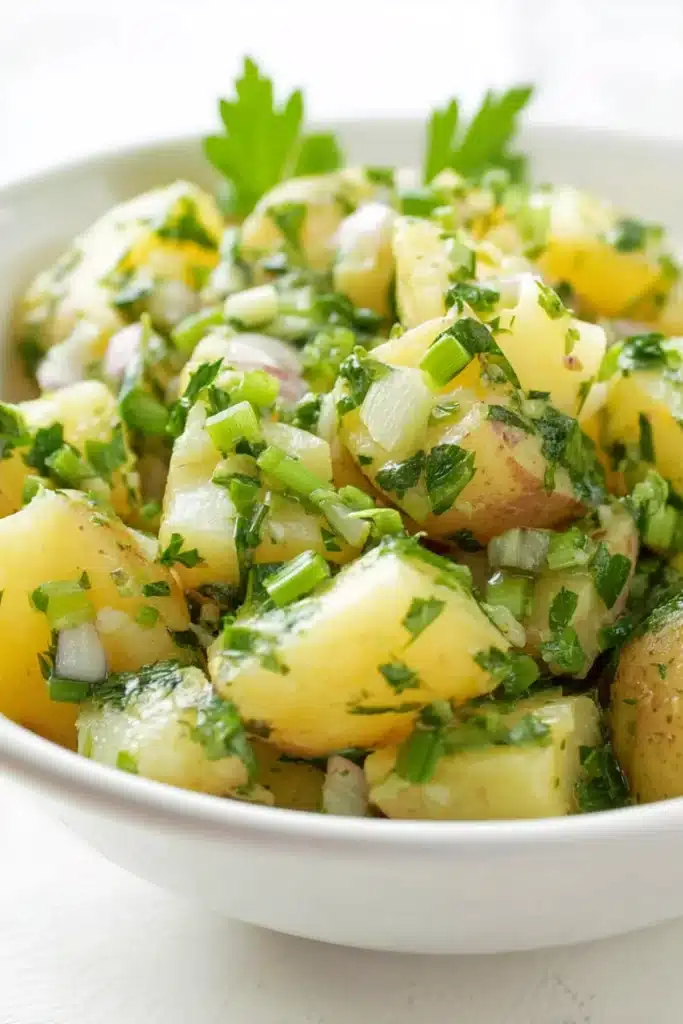
A Guilt-Free Twist on a Classic Favorite
When it comes to comfort food, potato salad usually lands on the “cheat day” list. But Lebanese potato salad breaks that mold entirely. It’s not just flavorful—it’s also light, heart-healthy, and completely plant-based.
You won’t find any mayo, eggs, or heavy cream here. Just simple, wholesome ingredients that come together in a naturally gluten-free and dairy-free dish. This makes it a perfect fit for vegan and clean-eating diets.
The ingredients in Lebanese potato salad aren’t just tasty—they’re packed with nutritional value.
| Ingredient | Health Benefit |
|---|---|
| Potatoes | Rich in fiber, potassium, and Vitamin B6 |
| Olive Oil | High in heart-healthy monounsaturated fats |
| Lemon Juice | Loaded with Vitamin C and antioxidants |
| Parsley & Mint | Natural detoxifiers and anti-inflammatories |
| Garlic (optional) | Known for immune-boosting properties |
Each forkful brings a combination of healing, energizing, and anti-inflammatory properties. It’s the kind of dish that leaves you satisfied—not sluggish.
Scientifically-Backed Nutrition
Let’s break down the key nutritional stars of this dish:
- Olive Oil is a staple in the Mediterranean diet and widely known for promoting heart health. It helps lower bad cholesterol (LDL) while increasing good cholesterol (HDL). Read more about olive oil’s benefits here.
- Lemon juice, high in Vitamin C, strengthens the immune system and acts as a natural detoxifier. It also enhances iron absorption from plant-based foods. Learn more about the science of lemon at Wikipedia’s Lemon page.
Together, these ingredients make Lebanese potato salad a superfood-style side dish. You get clean carbs, healthy fats, detoxifying herbs, and gut-friendly fiber—all in one bowl.
Why It Fits Modern Diets So Well
Whether you’re on a Mediterranean diet, plant-based lifestyle, or simply trying to eat cleaner, Lebanese potato salad is an easy win. Here’s why:
- Low in calories, but high in satisfaction
- No artificial ingredients or processed fillers
- No dairy or gluten, which makes it allergy-friendly
- It’s versatile enough for lunchboxes, potlucks, or BBQs
When you choose this version over a traditional creamy salad, you’re making a smart choice for your body—and your taste buds.
And let’s not forget: it tastes incredible.
The Cultural Significance of Potato in Lebanese Cuisine
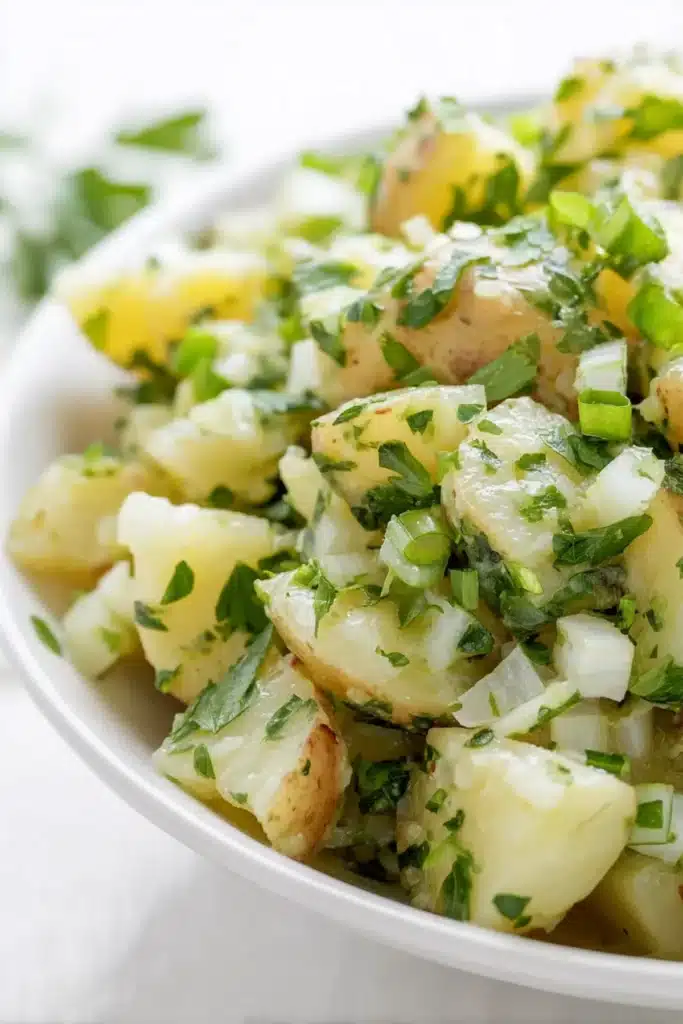
A Humble Ingredient with Deep Roots
In Lebanon, potatoes are more than just a pantry staple—they’re a symbol of comfort, family, and community. From simple home kitchens in Beirut to mountain villages in the Bekaa Valley, dishes like Lebanese potato salad bring people together.
Historically, potatoes became popular in Lebanon during times of economic hardship. They were affordable, easy to grow, and could stretch into several meals. But it wasn’t long before they were elevated with the flavors of lemon, olive oil, mint, and parsley, turning them into something that transcended their simplicity.
Lebanese potato salad is often served alongside grilled meats like kafta or shish taouk, as well as with lentil-based dishes and mezze platters. It’s the kind of recipe that shows up at family BBQs, Sunday lunches, and large gatherings—not because it’s fancy, but because it brings everyone joy.
Family, Flavor, and Tradition in Every Bite
Ask any Lebanese cook, and they’ll likely have their own version of Lebanese potato salad—some use more lemon, others skip garlic, and a few throw in a dash of sumac for added tang. But the essence remains the same: clean ingredients, balanced flavor, and love in the preparation.
There’s something almost sacred about this salad. It’s made in quiet kitchens on weekday nights and on noisy balconies filled with cousins, laughter, and music. It’s eaten straight from the bowl during a conversation, or served proudly on a decorative plate at weddings and holidays.
One bite, and it brings you back to the roots of Lebanese hospitality: nourishing others with warmth, generosity, and real food.
Even the act of making Lebanese potato salad is steeped in memory—peeling potatoes while talking to your mother, chopping herbs as your aunt shares stories, or adding that final splash of lemon the way your grandmother always did.
That’s what makes this salad timeless. It’s not just about how it tastes—it’s about what it means.
The Caribbean Potato Salad brings island-inspired flavor with every bite.
Common Variations You Can Try
Make It Your Own Without Losing Its Soul
One of the best things about Lebanese potato salad is its flexibility. While the traditional version sticks to lemon, olive oil, parsley, mint, and spring onions, there’s plenty of room to customize it while keeping its authentic character.
If you’re cooking for guests, making it weekly for meal prep, or just craving something different, these small additions can create big flavor changes without overcomplicating the recipe.
Here are some of the most popular and delicious variations:
Add a Crunchy Twist
If you love texture in your salads, you’re not alone. While the potatoes provide that soft, starchy comfort, a bit of crunch can elevate the overall bite of your Lebanese potato salad.
Try mixing in:
- Sliced radishes – peppery and crisp
- Diced cucumbers – fresh and hydrating
- Celery – subtle but adds structure
These ingredients not only bring texture but also freshness, making the salad even more refreshing during hot summer days.
Upgrade the Flavor with Spices
The beauty of Lebanese cuisine is how effortlessly it balances spices and herbs. With just a few additions, you can give your Lebanese potato salad a deeper, more complex flavor profile.
Consider adding:
- Sumac – A tangy, reddish spice that enhances the lemony profile
- Aleppo pepper flakes – Mild heat with a touch of sweetness
- Za’atar – A herb mix that pairs wonderfully with potatoes
Just a pinch of one of these spices can transform the dish while keeping it grounded in traditional Lebanese flavor.
Swap or Add Herbs
Mint and parsley are the go-to herbs in a classic Lebanese potato salad, but there’s no rule against getting creative.
Other herbs that blend well include:
- Fresh dill – pairs nicely with lemon
- Cilantro – gives the salad a different, slightly sharper edge
- Chives – for a more refined onion flavor
You can mix and match herbs depending on what’s in your fridge or garden—making your own signature version of this classic dish.
Add Protein for a Complete Meal
Want to turn your Lebanese potato salad into a light main course? Toss in a protein source that doesn’t overwhelm the flavors.
Great options include:
- Chickpeas – For a plant-based boost
- Grilled chicken strips – Light and neutral enough to blend in
- Boiled eggs – If you’re not strictly vegan, this adds richness
These additions make the salad more filling while keeping it healthy and balanced.
No matter which variation you try, the core identity of Lebanese potato salad stays intact: light, zesty, and full of Mediterranean goodness. Whether you’re tweaking it to match your diet, your pantry, or your mood, the result will always feel fresh, homemade, and deeply satisfying.
Tips for the Perfect Lebanese Potato Salad Every Time
Master the Basics, Then Make It Yours
Even though Lebanese potato salad is beautifully simple, there’s a fine line between a decent version and a truly unforgettable one. From the type of potato you choose to how long you let the flavors rest, the details matter.
Below are the essential tips to help you make a foolproof Lebanese potato salad, whether it’s your first time or your fiftieth.
Choose the Right Potatoes
The kind of potato you use can make or break your salad. Lebanese potato salad relies on potatoes that stay firm after boiling but are still soft enough to absorb flavor.
- Use waxy potatoes like Yukon Gold, red potatoes, or Charlotte varieties.
- Avoid russet or starchy potatoes as they break down too easily and turn the salad mushy.
When you start with the right base, the texture stays consistent and satisfying from the first bite to the last.
Don’t Skip the Cooling Step
After boiling, let the potatoes cool slightly before mixing them with herbs and dressing. Why?
- Hot potatoes will absorb the dressing too fast and can become greasy.
- Over-mixing hot potatoes leads to breakage, which turns your salad into a mash.
Instead, give the potatoes 10–15 minutes to cool naturally. They should still be warm—but not steaming—when you dress them.
Use Fresh, High-Quality Ingredients
Because Lebanese potato salad has so few ingredients, freshness is everything.
- Choose bright green parsley and firm mint leaves—skip anything wilted or dull.
- Use freshly squeezed lemon juice, not bottled.
- Invest in a good extra virgin olive oil—it’s the backbone of your dressing.
A high-quality olive oil doesn’t just coat the potatoes—it transforms them. Combined with the lemon juice, it creates that signature silky, tangy finish you expect in every authentic bite.
Toss Gently, Not Aggressively
One of the most common mistakes? Stirring too roughly. The goal is to coat each potato chunk in flavor without turning them into mashed potatoes.
Here’s how:
- Use a large bowl with plenty of space.
- Toss with a wide spoon or spatula, lifting and folding rather than stirring.
- Add the dressing in two parts if needed: half to coat, then half to finish.
Remember, Lebanese potato salad should look vibrant and rustic—not broken or mushy.
This Steak and Potato Salad pairs perfectly with grilled meats for a complete meal.
Let the Flavors Settle
The magic of Lebanese potato salad happens after you mix everything. Allow the salad to rest for 15–30 minutes before serving. This gives time for:
- The lemon and olive oil to fully soak into the potatoes.
- The herbs to release their aroma and settle into the dish.
And if you have time, chill it in the fridge for an hour or two. It’s even better when served cold the next day!
A perfect Lebanese potato salad is a balance of flavor, texture, and tradition. These small techniques make all the difference—and turn your humble ingredients into a dish that feels elevated yet comforting.
Serving Suggestions for Maximum Flavor
Simple Dish, Endless Pairings
One of the most beautiful things about Lebanese potato salad is its versatility. It fits anywhere—whether you’re building a light vegan lunch or adding a fresh side to a hearty dinner spread. Its zesty, herbaceous flavor can balance spicy dishes, grilled meats, or other Mediterranean classics.
This isn’t just a side dish—it can be the centerpiece of your meal when plated and paired thoughtfully.
Pair It with Classic Lebanese Dishes
If you want to create a full Lebanese spread, here are some perfect matches for Lebanese potato salad:
| Dish | Why It Works |
|---|---|
| Grilled Kafta | The herby salad balances the smoky meat |
| Chicken Shawarma | Bright lemony tones cut through richness |
| Mujadara | Adds a fresh contrast to lentils and rice |
| Falafel Wraps | Great as a tangy side or inside a wrap |
| Hummus & Pita | Together they form the perfect mezze trio |
These combinations work beautifully for dinners, gatherings, or even a weekend meal prep plan. Lebanese potato salad provides brightness and a cooling element on the plate that rounds out spicy or deep flavors.
Serve It Warm, Room Temp, or Cold
Depending on the season or your preference, Lebanese potato salad adapts easily:
- Warm: Serve shortly after mixing while the potatoes still retain some heat. Great for chilly evenings.
- Room temperature: Ideal for BBQs and buffets—no rush to keep it chilled.
- Cold: Perfect for summer lunches, picnics, or meal prep. Just chill it for an hour or two in the fridge.
No matter how you serve it, the flavor will continue to improve as the ingredients rest together.
Presentation Ideas to Impress
Want to impress guests? Try one of these plating ideas for your Lebanese potato salad:
- Layered in a shallow ceramic dish with lemon slices and parsley on top for a rustic, traditional look.
- Packed in a glass lunchbox with grilled veggies and hummus for a balanced, on-the-go meal.
- Mounded on a mezze platter surrounded by olives, tabbouleh, and labneh for an eye-catching starter.
It’s proof that you don’t need fancy ingredients to make something beautiful—just intention and care.
Whether you’re feeding your family, preparing lunch for the week, or bringing a dish to a gathering, Lebanese potato salad always delivers flavor, freshness, and a little touch of Lebanese soul.
FOLLOW ME IN PINTEREST FOR MORE RECIPES
Storing and Meal Prepping Tips
Fresh Today, Even Better Tomorrow
One of the best parts about making Lebanese potato salad is that it holds up beautifully for meal prep. Whether you’re making a big batch for the week or storing leftovers from a dinner party, this salad is low-maintenance and stays delicious for days.
But there are a few tricks to storing it right—so you keep that vibrant texture and flavor intact.
How to Store Lebanese Potato Salad
Once you’ve tossed your salad and allowed the flavors to settle, store it in an airtight container. Glass containers are ideal, but BPA-free plastic works fine too.
Here’s what to keep in mind:
- Refrigerator: Store in the fridge for up to 3 days.
- Keep it sealed: Air exposure will dry out the potatoes and dull the herbs.
- Don’t freeze it: Freezing changes the texture of cooked potatoes, turning them grainy and unpleasant.
Tip: If the salad feels a little dry after chilling, revive it with a fresh drizzle of lemon juice and olive oil just before serving.
Best Practices for Meal Prep
If you’re prepping Lebanese potato salad in advance for work lunches or party platters, these tips help keep everything fresh and flavorful:
- Store components separately: Boil and chill the potatoes, chop the herbs, and prep the dressing—but don’t mix until the day you plan to eat.
- Mix in small batches: This helps avoid soggy textures or wilted herbs over time.
- Keep herbs dry: After washing parsley and mint, pat them completely dry. Excess moisture can lead to sliminess or spoilage.
Pack It for On-the-Go Meals
Lebanese potato salad makes a fantastic portable lunch. Here’s how to make it even better:
- Pair it with hummus, grilled chicken, or roasted veggies.
- Add a side of warm pita or whole grain crackers.
- Include an extra wedge of lemon for a quick squeeze before eating.
Its refreshing, tangy flavor holds up well even after hours in the fridge, making it a no-fuss option for busy days.
In short, Lebanese potato salad is as flexible and reliable as it is flavorful. Make it once and enjoy it for days—fresh, healthy, and ready when you are.
FAQs About Lebanese Potato Salad
What is in Lebanese potato salad?
What is a Lebanese style potato?
What is in a Lebanese salad?
What are the 4 ingredients in potato salad?
Boiled potatoes
Lemon juice
Olive oil
Chopped parsley
That’s the core of the recipe. From there, you can build flavor with mint, onions, and spices, but even the minimalist version is bright and satisfying.
A Recipe That Nourishes More Than Just Hunger
At its heart, Lebanese potato salad is more than a dish—it’s a memory. A tradition. A reminder that sometimes, the simplest things bring the most joy. With every forkful, you’re tasting generations of heritage, the freshness of a Mediterranean garden, and the warmth of home.
Whether you’re preparing it for your family, sharing it with friends, or just feeding your soul on a quiet afternoon, this salad never disappoints. It’s honest, it’s flavorful, and it always tastes like love.
Try it once, and you’ll see why it’s a timeless favorite from Lebanon to your table.
FOLLOW ME IN PINTEREST FOR MORE RECIPES



